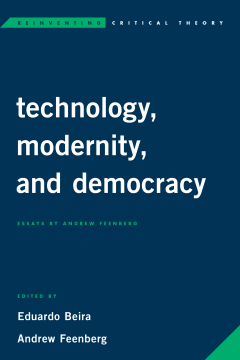
Additional Information
Book Details
Abstract
This important collection of essays by Andrew Feenberg presents his critical theory of technology, an innovative approach to philosophy and sociology of technology based on a synthesis of ideas drawn from STS and Frankfurt School Critical Theory.
According to critical theory of technology, technologies are neither neutral nor deterministic, but are encoded with specific socio-economic values and interests. Feenberg explores how they can be developed and adapted to more or less democratic values and institutions, and how their future is subject to social action, negotiation and reinterpretation. Technologies bring with them a particular "rationality," sets of rules and implied ways of behaving and thinking which, despite their profound influence on institutions, ideas and actions, can be transformed in a process of democratic rationalization. Feenberg argues that the emergence of human communication on the Internet and the environmental movement offer abundant examples of public interventions that have reshaped technologies originally designed for different purposes. This volume includes chapters on citizenship and critical theory of technology, philosophy of technology and modernity, and Heidegger and Marcuse, two of the most prominent philosophers of technology.
Andrew Feenberg has done more than anyone else to develop a critical constructivism that ensures the relevance of critical theory to technology studies in the 21st century. This collection of essays is a fine crystallisation of that perspective and represents the ideal point of entry for anyone new to Feenberg’s thought.
Graeme Kirkpatrick, Head of Sociology, University of Manchester
This impressive collection of essays shows why Feenberg is rightly regarded as the leading expert on science and technology studies writing today. Having participated in pioneering developments in medical research protocols, on-line education platforms, and digital information systems, he brings a profound critical awareness to the social politics informing the democratization of science and technology in the age of economic domination.
David Ingram, Loyola University, Chicago
Andrew Feenberg is Canada Research Chair in Philosophy of Technology in the School of Communication, Simon Fraser University, where he directs the Applied Communication and Technology Lab. His many publications include Lukács,Marx and the Sources of Critical Theory (1981 and 1986), Critical Theory of Technology (1991 and 2002), Alternative Modernity (1995), Questioning Technology (1999), Heidegger and Marcuse: The Catastrophe and Redemption of History (2005), Between Reason and Experience: Essays in Technology and Modernity (2010), The Philosophy of Praxis: Marx, Lukács and the Frankfurt School (2014) and Technosystem: The Social Life of Reason (2017).
Eduardo Beira is an engineer teaching at the University of Minho and the MIT Portugal Program.
Table of Contents
| Section Title | Page | Action | Price |
|---|---|---|---|
| Contents | iv | ||
| Preface | vi | ||
| Introduction | 1 | ||
| Part I. THE PHILOSOPHY OF TECHNOLOGY | 11 | ||
| Chapter One. Encountering Technology | 13 | ||
| Chapter Two. Ten Paradoxes of Technology | 37 | ||
| Chapter Three. What Is Philosophy of Technology? | 55 | ||
| Part II. TECHNICAL CITIZENSHIP | 65 | ||
| Chapter Four. Technoscience and Democracy | 67 | ||
| Chapter Five. Agency and Citizenship in a Technological Society | 81 | ||
| Chapter Six. Function and Meaning: The Double Aspects of Technology | 95 | ||
| Part III. HEIDEGGER AND MARCUSE | 115 | ||
| Chapter Seven. Heidegger and Marcuse: On Reification and Concrete Philosophy | 117 | ||
| Chapter Eight. The Politics of Meaning: Modernity, Technology, and Rationality | 127 | ||
| Notes | 147 | ||
| References | 151 | ||
| Proper Name Index | 157 | ||
| Concept Index | 159 |
